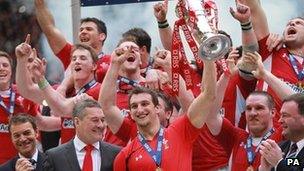Has Miliband got his nations in a twist?
- Published

How many teams should really be playing in the Six Nations rugby competition?
If Ed Miliband worked for the BBC, he would have been sacked.
One-nation politics is so contrary to the BBC's guidelines that the corporation would not even have formed a committee to consider, report and procrastinate.
It would have placed a large bureaucratic boot at the Labour leader's nether regions and kicked him out of the door faster than you could say Professor King. (The prof wrote a learned paper a few years back on how the BBC was too Anglo-centric).
For, as any fule knos, the BBC serves four nations, not one. The joy of its output is that, as a chap who lives in southern England, I am admirably well informed about the progress of Scottish football teams, the workings of the Welsh health service, and the internal machinations of the Stormont assembly. And, I hope, vice versa.
Linguistic mismatch
This modest paradox has been puzzling me since Mr Miliband's speech to his party conference. We know that when he speaks of one nation he means one country, one political unity that brings together the four nations, one united kingdom. The trouble is that his language of one nation doesn't accurately reflect that.
This linguistic mismatch was most acutely apparent in the section of his speech where he made a strong defence of the union.
Punchy, powerful stuff it was, but this was the one bit of the speech where Mr Miliband suddenly stopped talking about one-nation politics every other sentence. And that was because he couldn't. It would have been absurd.
The irony is that this is one area of policy where some deep thinking is going on within Labour. Some in the party are already musing on what might happen after an independence referendum has been seen off.
Some fear that in the constitutional settlement that might follow, greater devolution might cost the party Westminster seats north of the border. Others in the shadow cabinet fear that the Scottish people might succumb to buyers' remorse and give Alex Salmond another run as First Minister in 2016.
After all, the threat of independence would have gone and many Scots might like the idea of keeping a leader with a track record of prodding Westminster with a pointed stick. Labour hopes that the SNP's record in office and possible internal divisions after a referendum might give them something to attack. But the worries are there.
For now, most of this speculation is for the future, if not the birds. But what is interesting is the implicit assumption within Labour now, namely that the SNP will shortly accept a single-question referendum and that the SNP will lose that referendum in 2014.
For anyone puzzled by Ed Miliband's confusing talk of non-religious faith, here perhaps is an indication of what it might mean in practice.